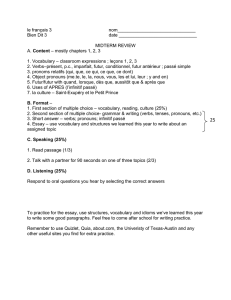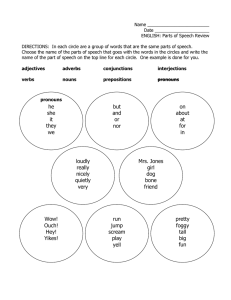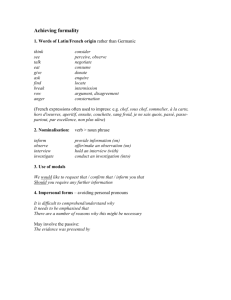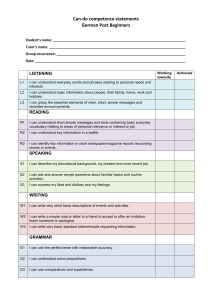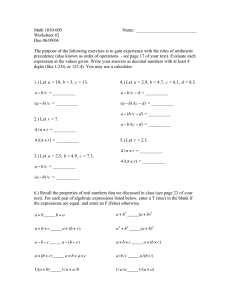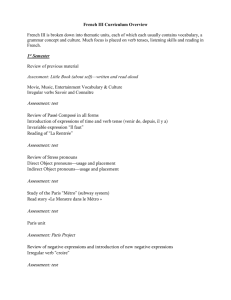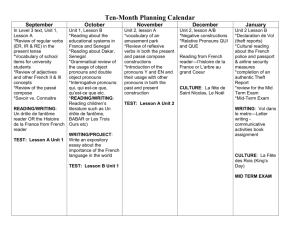ROSE TREE MEDIA SCHOOL DISTRICT COURSE CURRICULUM COURSE TITLE:
advertisement
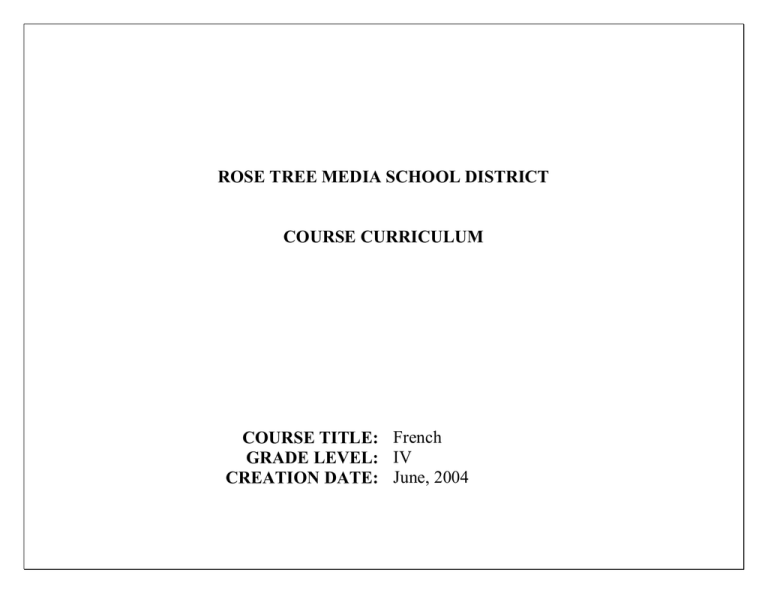
ROSE TREE MEDIA SCHOOL DISTRICT COURSE CURRICULUM COURSE TITLE: French GRADE LEVEL: IV CREATION DATE: June, 2004 Essential Question, Concept or Theme: A. Communication: Engaging in conversations, providing and obtaining information, expressing feelings and emotions, and exchanging opinions. Understanding and interpreting written and spoken language on a variety of topics. Presenting information, concepts, and ideas to an audience of listeners or readers on a variety of topics. Approx. Time Allotment: PA Standards: 1.1, 1.2, 1.3 Aligned Materials/ Resources/Technology Benchmark/Skills Assessment Vocabulary: Words and Expressions relating to travel, newspapers and magazines, leisure activities, words and expressions relating plays and theatrical performances, the arts, Words and expressions relating to mental and physical health, physical fitness, Words and Expressions relating to ecology, Words and Expressions relating to the European Union, Words and Expressions relating to social problems in France Grammar Pronouns: the pronoun “y” referring to places and things already mentioned, the pronoun “en” referring to things already mentioned, review of “qui” and “que”, the relative pronouns “ce qui” and “ ce que”, dont, interrogative, demonstrative and possessive pronouns Verbs: the formation of the futur antérieur, the formation of regular and irregular verbs in the passé simple, the formation of the plus-queparfait, the formation of le conditionnel passé. Verbal forms: the past infinitive and the present participle Syntax: the use of “si” in conditional sentences, the causative”faire”, the futur and futur antérieur with “quand” clauses, the use of “depuis” with present and imperfect tenses,the subjunctive after certain prepositions, the use of the passé simple, combining simple sentences to form complex sentences by using relative pronouns qui, que, ce qui, ce que and dont, relative pronouns with prepositions, the use of the past infinitive and present participle, prepositions with geographic names Produce and perform brief guided conversations related to student's needs and interests Create brief conversations related to public place functions in simulation-travel, current events, leisure activities, the theater, character traits, values, health and well-being, the arts and sciences Make and cancel plane and train reservations Express wishes, preferences, or demands concerning others and how to express necessity and possibility Read and discuss excerpts from these literary works: Le Petit Prince, a tale by Antoine SaintExupéry, and Agence de voyages, a play by Eugène Ionesco Be able to handle everyday situations such as inviting somebody to go to lunch Be able to extend invitations, and how to accept or refuse them Read and discuss excerpts from some literary works: La Nausée by Jean-Paul Sartre and La Réclusion solitaire by Tahar Ben Jelloum Read and discuss the poetic song Les Feuilles mortes by Jacques Prevert Express your opinions of certain leisure activities Express agreement and disagreement, and discuss various subjects such as the news, social problems, etc, with others Read and discuss headlines and new items that frequently appear in local newspapers Describe past actions in formal writing Read and discuss a chapter from Les Misérables by Victor Hugo Discuss American character traits Express personal impressions, opinions and reactions French IV Page 1 Text En Voyage ( Glencoe, Macmillan/McGraw-Hill,1994) Student Edition Teacher’s wraparound edition Writing activities Workbook & Student tape manual, Student edition Writing activities Workbook, Teacher’s annotated edition Student tape manual, teacher’s edition ( tape script) Audio cassette program Overhead transparencies Video cassette program Computer software: Practice and test generator Communication Activities masters Bell ringer review black line masters Situation cards Chapter quizzes with answer key Testing program with answer key Other Scholastic Magazine- Chez Nous Verb Sheets Internet Hardware CD Player Cassette tape recorder VCR player DVD player Computer -1- Instructional Strategies Oral Presentations Simulated activities through role playing Paired communicative activities Cooperative learning groups Drilling Memorization Dictation TPR activities Visual and verbal cues ( e.g. situation cards ) Modeling Realia Audio tape activities Videotape activities Overhead transparency activities Computer software activities Games, skits, songs and puzzles Speaking and writing activities ( e.g. Workbook exercises, taking notes, listing, categorizing, labeling, summarizing, comparing, contrasting) Activating prior knowledge Interviewing Reading aloud- teacher Reading aloud- student Internet activities Brainstorming June, 2004 Essential Question, Concept or Theme: A. Communication: Engaging in conversations, providing and obtaining information, expressing feelings and emotions, and exchanging opinions. Understanding and interpreting written and spoken language on a variety of topics. Presenting information, concepts, and ideas to an audience of listeners or readers on a variety of topics. Approx. Time Allotment: PA Standards: 1.1, 1.2, 1.3 Benchmark/Skills Aligned Materials/ Resources/Technology Assessment Instructional Strategies Review how to identify cities, countries, and continents: how to refer to places and things already mentioned: and how to tell what you and other people will do Read and discuss newspaper articles about ecology Tell what you and other people will do before a future event Read and discuss these literary works: a poetic song, Gens du Pays, by Gilles Vigneault; a short story, La Dernière Classe by Alphonse Daudet Demonstrate comprehension of short face to face and audio conversations on familiar topics Assess main idea of simple oral/written narratives and texts on familiar topics Talk about who does the chores in your house if they are divided fairly Express congratulations, best wishes, and condolences in typical real-life situations Express wishes, preferences, and demands Read and discuss the daily announcements page of a French newspaper and a French magazine article Express “ of which” and “whose”, how to write complex sentences using prepositions and relative pronouns Express certainty and doubt Talk about past actions that precede other past action Express emotional reactions to the actions of others Read and discuss the poetic song “ La Mauvaise Réputation” by Georges Brassens; a letter from Lettres persanes by Montesquieu ; and the poem “Liberté” by Paul Eluard Express doubt, uncertainty, or disbelief about present, past or future actions Tell what people or things seem to be like French IV Page 2 -2- June, 2004 Essential Question, Concept or Theme: A. Communication: Engaging in conversations, providing and obtaining information, expressing feelings and emotions, and exchanging opinions. Understanding and interpreting written and spoken language on a variety of topics. Presenting information, concepts, and ideas to an audience of listeners or readers on a variety of topics. Approx. Time Allotment: PA Standards: 1.1, 1.2, 1.3 Benchmark/Skills Aligned Materials/ Resources/Technology Assessment Instructional Strategies Describe two related activities Talk about health care situations such as having a medical checkup Express emotions about past events Discuss your physical and emotional health Express certainty and uncertainty Give direct and indirect commands Distinguish words and phrases heard or seen in songs, newspapers, magazine articles, literature, plays Express “which one(s)”, “this one,” “that one,””these,”or “those,” Telle what belongs to you and others Read and discuss exerpts from the following literary works: Le Malade Imaginaire, a play by Molière; and Knock ou le Triomphe de la médecine, a play by Jules Romains Read about a visit to a French monument and learn to express feelings about it Express your reactions (positive and negative) to works of art of all kinds Express conditions and how to ask things politely; describe actions that precede other actions in the past and to describe people, events, and simultaneous actions Read and discuss about Toulouse –Lautrec, a French painter, and an episode from the adventures of Tintin, a famous comic strip hero Express what would happen if certain conditions had prevailed Read and discuss the following literary works: Le Jet d’eau, a poem by Guillaume Apollinaire; an excerpt from Sans dessus dessous, a novel by Jules Verne; La Légende de la peinture, a tale by Michel Tournier Utilize appropriate responses to oral and/or written French IV Page 3 -3- June, 2004 Essential Question, Concept or Theme: A. Communication: Engaging in conversations, providing and obtaining information, expressing feelings and emotions, and exchanging opinions. Understanding and interpreting written and spoken language on a variety of topics. Presenting information, concepts, and ideas to an audience of listeners or readers on a variety of topics. Approx. Time Allotment: PA Standards: 1.1, 1.2, 1.3 Benchmark/Skills Aligned Materials/ Resources/Technology Assessment Instructional Strategies requests, directions and other information Demonstrate comprehension and use for contextualized understanding of isolated words or phrases in authentic but unfamiliar printed material or announcements from target culture Repeat unfamiliar words that recombine familiar sound patterns and letter combinations Use knowledge of linguistic system (grammar, word patterns) to derive meaning from unfamiliar material Use cognates to facilitate comprehension Read aloud familiar stories, passages, dialogues etc. with appropriate intonation and comprehensible pronunciation Recite proverbs, nursery rhymes, short poems, and songs Compose and present simple guided texts on familiar topics Reproduce in written form most language that is used orally Use oral or written language to give messages, and complete short guided paragraphs, etc. Use oral or written language to produce and share illustrated stories or projects Interpret and use gestures germane to the language Practice skills using “Teacher of the Day” Evaluate communicative skills using discrete point quizzes and prochievement Chapter Tests Recite dialogues Create role plays Assess aural comprehension via dictation Develop oral Presentations using relevant vocabulary and grammatical concepts Construct reports Assess listening skills using TPR French IV Page 4 -4- June, 2004 Essential Question, Concept or Theme: A. Communication: Engaging in conversations, providing and obtaining information, expressing feelings and emotions, and exchanging opinions. Understanding and interpreting written and spoken language on a variety of topics. Presenting information, concepts, and ideas to an audience of listeners or readers on a variety of topics. Approx. Time Allotment: PA Standards: 1.1, 1.2, 1.3 Adaptations/Inclusion Techniques Point out features of the program Review prior knowledge and skills Emphasize cognates as a learning strategy Model pronunciation Use organizers Employ TPR Extend or adapt written practice Allow extra time for practice and assessment Limit or modify activities, assignments and assessments Examine patterns Reinforce and review Clarify expectations and goals Explain unfamiliar concepts and terminology Use contextural clues Assist in developing possibilities Support with realia Color code or highlight Provide tutoring and peer mentoring Employ memory techniques Provide Individualized Instruction Give advance notice regarding future assignments Note taking by classmates for reproduction Consult IEP’s Engage in ongoing communication with Special Education caseworkers French IV Enrichment Strategies World Language Departmental Initiatives Immersion trips to Canada Reciprocal Exchange program to France District World Language Contest and Fête (award program) Phyllis Kavanaugh Scholarship National Contests World Language Honor Society Fun Day Level IV Opportunities Field trips Music Student designed activities Challenge for credit Independent study Enhancement activities (e.g. provide extra reading material, extra listening and speaking opportunities) Guest speakers/ Visiting artists Out of class enhancement activities (e.g. Movies, language luncheon groups) Page 5 Remediation Strategies Multicultural/Interdisciplinary Connection World Languages- French, German, Latin, Spanish(compare and contrast languages within the discipline) Mathematics (currency exchange, measurement systems) Geography (maps, demographics, climate) Language Arts (etymology, linguistics, literature, writing, public speaking, grammar and syntax, theater and cinema) Social Studies (culture, civics, history, humanities, economics, ethnicity, government) Music (folk songs, dances, popular music, musical instruments) Art (art history, crafts, student art projects, architecture) Science (famous scientists, ecology, natural sciences) Consumer Sciences (cuisine, etiquette, fashion, advertising) Physical Education (sports, recreational activities, health and fitness) Technology Education (student projects and research utilizing technology) -5- June, 2004 Essential Question, Concept or Theme: B. Connections: Reinforcing and furthering knowledge of other disciplines through the World Language. Acquiring information and recognizing the distinctive viewpoints that are only available through the world language and its culture. Comparisons: Recognizing that different languages use different ways to communicate and can apply that knowledge to their own language. Demonstrating an understanding of the concept of culture through comparisons of cultures studied and their own. Community: Using the language both within and beyond the school setting. Using language for leisure and personal enrichment. PA Standards: 3.1, 3.2, 4.1, 4.2, 5.1, 5.2 Aligned Materials/ Resources/Technology Benchmark/Skills Assessment SKILLS Words and Expressions relating to travel, newspapers and magazines, leisure activities, words and expressions relating plays and theatrical performances, the arts, Words and expressions relating to mental and physical health, physical fitness, Words and Expressions relating to ecology, Words and Expressions relating to the European Union, Words and Expressions relating to social problems in France Grammar Pronouns: the pronoun “y” referring to places and things already mentioned, the pronoun “en” referring to things already mentioned, review of “qui” and “que”, the relative pronouns “ce qui” and “ ce que”, dont, interrogative, demonstrative and possessive pronouns Verbs: the formation of the futur antérieur, the formation of regular and irregular verbs in the passé simple, the formation of the plusque-parfait, the formation of le conditionnel passé. Verbal forms: the past infinitive and the present participle Syntax: the use of “si” in CONNECTIONS Use every day number skills to do simple math problems and to calculate currency equivalencies in the target language Use dates to identify notable events and express numbers beyond 1,000 Demonstrate a knowledge of purchasing tickets for various forms of transportation in France Make, label and read maps using appropriate geographical terms in the target language Manipulate the applications of the metric system in talking about weather, height, weight, distance Recognize famous historical events, people, landmarks, places, products from the target culture Demonstrate knowledge of schedules of various forms of public transportation Know how to get information you need in different travel situations Examine American holiday celebrations, historical events, place names, famous people and events from the target culture perspective and influence Learn about the travel habits of the French and about tourism in France Discuss how French youths keep up with current events and why they think it is important to do so Read and discuss magazine articles about French youths and their money, and everyday life in France in 1900 Learn about some leisure activities such as attending a play, including buying tickets and discussing the play afterwards Learn about the history and tradition of “ la chanson française” Discuss what leisure activities French people of different ages enjoy Learn about the European Union and how it came about French IV Approx. Time Allotment: Page 6 Text En Voyage ( Glencoe, Macmillan/McGraw-Hill,1994) Student Edition Teacher’s wraparound edition Writing activities Workbook & Student tape manual, Student edition Writing activities Workbook, Teacher’s annotated edition Student tape manual, teacher’s edition ( tape script) Audio cassette program Overhead transparencies Video cassette program Computer software: Practice and test generator Communication Activities masters Bell ringer review black line masters Situation cards Chapter quizzes with answer key Testing program with answer key Other Scholastic Magazine- Chez Nous Verb Sheets Internet Hardware CD Player Cassette tape recorder VCR player DVD player Computer -6- Instructional Strategies Oral Presentations Simulated activities through role playing Paired communicative activities Cooperative learning groups Drilling Memorization Dictation TPR activities Visual and verbal cues ( e.g. situation cards ) Modeling Realia Audio tape activities Videotape activities Overhead transparency activities Computer software activities Games, skits, songs and puzzles Speaking and writing activities ( e.g. Workbook exercises, taking notes, listing, categorizing, labeling, summarizing, comparing, contrasting) Activating prior knowledge Interviewing Reading aloud- teacher Reading aloud- student Internet activities Brainstorming June, 2004 Essential Question, Concept or Theme: B. Connections: Reinforcing and furthering knowledge of other disciplines through the World Language. Acquiring information and recognizing the distinctive viewpoints that are only available through the world language and its culture. Comparisons: Recognizing that different languages use different ways to communicate and can apply that knowledge to their own language. Demonstrating an understanding of the concept of culture through comparisons of cultures studied and their own. Community: Using the language both within and beyond the school setting. Using language for leisure and personal enrichment. PA Standards: 3.1, 3.2, 4.1, 4.2, 5.1, 5.2 Aligned Materials/ Resources/Technology Benchmark/Skills Assessment conditional sentences, the causative”faire”, the futur and futur antérieur with “quand” clauses, the use of “depuis” with present and imperfect tenses, the subjunctive after certain prepositions, the use of the passé simple, combining simple sentences to form complex sentences by using relative pronouns qui, que, ce qui, ce que and dont, relative pronouns with prepositions, the use of the past infinitive and present participle, prepositions with geographic names Learn about the social problems in France Learn how to report problems and crimes to the police Learn about people’s concern about their health and physical fitness, and what they do to maintain both Learn about French people’s passion for their artistic heritage and the pride they take in it, and about the latest achievements in scientific research Discuss the advantages of learning a foreign language for future employment Apply as appropriate language arts skills to the target language-punctuation, dictionary skills, reading and writing skills Demonstrate awareness of artistic, scientific and musical contributions, and practices present in the target culturefamous scientists and their contributions, famous works of art, special musical instruments, famous artists or composers, well known songs Discuss movies, plays, museums Use computer, multimedia, traditional texts and printed material to find information on familiar themes to integrate in other target language activities (menus, phone book ads, TV and movie listings, advertisements, public transportation schedules) Analyze form, presentation, layout of target culture products to examine culturally imbedded features COMPARISONS Recognize borrowed words from the target language Recognize Anglicisms present in the target language Compare grammatical structures, pronunciation and writing systems between native and target languages Identify different social conventions( e.g. forms of address, idiomatic expressions, table manners) Demonstrate understanding that vocabulary terms mean different things in different cultures French IV Page 7 -7- Approx. Time Allotment: Instructional Strategies June, 2004 Essential Question, Concept or Theme: B. Connections: Reinforcing and furthering knowledge of other disciplines through the World Language. Acquiring information and recognizing the distinctive viewpoints that are only available through the world language and its culture. Comparisons: Recognizing that different languages use different ways to communicate and can apply that knowledge to their own language. Demonstrating an understanding of the concept of culture through comparisons of cultures studied and their own. Community: Using the language both within and beyond the school setting. Using language for leisure and personal enrichment. PA Standards: 3.1, 3.2, 4.1, 4.2, 5.1, 5.2 Benchmark/Skills Aligned Materials/ Resources/Technology Assessment Approx. Time Allotment: Instructional Strategies Identify and understand cognates between languages Understand and use appropriate nonverbal communication of the target language Use the target language in a manner appropriate to the etiquette of the native speaker Compare and contrast basic conditions in the various target cultures( e.g. weather, seasons, food, customs) Speculate and defend perceptions on why certain products are important in the target culture Compare American and French character traits Compare various aspects of French and American cities and suburbs Tell some differences between French and American eating habits Compare and contrast ways similar holidays are celebrated in each culture Contrast French and American cultural activities Contrast and compare high schools in France and the U.S. Contrast good manners in France and the U.S. Compare climate, countryside, life, food, clothing, and cities of France, Canada, Africa with ones in the U.S. Learn what values are important to the French, both young and old, and compare them with yours COMMUNITY Find connections with the target culture through the use of technology, media and authentic sources Participate in structured curricular programs designed to extend learning beyond the classroom (e.g. visiting artists, field trips) Discover and utilize rich resources within the RTM community Use target language to respond to basic target language situations encountered in the students' daily life (e.g. read a menu, write to a pen pal, give directions to a visitor, thank French IV Page 8 -8- June, 2004 Essential Question, Concept or Theme: B. Connections: Reinforcing and furthering knowledge of other disciplines through the World Language. Acquiring information and recognizing the distinctive viewpoints that are only available through the world language and its culture. Comparisons: Recognizing that different languages use different ways to communicate and can apply that knowledge to their own language. Demonstrating an understanding of the concept of culture through comparisons of cultures studied and their own. Community: Using the language both within and beyond the school setting. Using language for leisure and personal enrichment. PA Standards: 3.1, 3.2, 4.1, 4.2, 5.1, 5.2 Benchmark/Skills Aligned Materials/ Resources/Technology Assessment Approx. Time Allotment: Instructional Strategies visiting artists, transportation) Listen to music, sing songs, and/or play instruments from target culture Participate in games and sports from target culture Read age-appropriate and linguistically appropriate materials from target culture Experience new foods from target culture View age-appropriate and linguistically appropriate films from target culture Appreciate target culture elements that are related to travel experiences Demonstrate survival skills in an immersion experience Evaluate communicative skills and cultural knowledge using discrete point quizzes and prochievement chapter tests Recite dialogues Create role plays Assess aural comprehension via dictation Select and order from a cafe menu Discuss daily activities and current events Produce projects( e.g. letters, train and plane schedules) Construct reports Develop oral presentations using relevant vocabulary, grammatical concepts and cultural knowledge. French IV Page 9 -9- June, 2004 Essential Question, Concept or Theme: B. Connections: Reinforcing and furthering knowledge of other disciplines through the World Language. Acquiring information and recognizing the distinctive viewpoints that are only available through the world language and its culture. Comparisons: Recognizing that different languages use different ways to communicate and can apply that knowledge to their own language. Demonstrating an understanding of the concept of culture through comparisons of cultures studied and their own. Community: Using the language both within and beyond the school setting. Using language for leisure and personal enrichment. PA Standards: 3.1, 3.2, 4.1, 4.2, 5.1, 5.2 Adaptations/Inclusion Techniques Enrichment Strategies Point out features of the program Review prior knowledge and skills Emphasize cognates as a learning strategy Model pronunciation Use organizers Employ TPR Extend or adapt written practice Allow extra time for practice and assessment Limit or modify activities, assignments and assessments Examine patterns Reinforce and review Clarify expectations and goals Explain unfamiliar concepts and terminology Use contextual clues Assist in developing possibilities Support with realia Color code or highlight Provide tutoring and peer mentoring Employ memory techniques Provide Individualized Instruction Give advance notice regarding future assignments Note taking by classmates for reproduction Engage in ongoing communication with Special Education case workers Consult IEP’s World Language Departmental Initiatives Immersion trips to Canada Reciprocal Exchange program to France District World Language Contest and Fete (award program) Phyllis Kavanaugh Scholarship National Contests World Language Honor Society Fun Day Community concert series French IV Level IV Opportunities Field trip Challenge for credit Independent study Enhancement activities (e.g. provide extra reading material, extra listening and speaking opportunities) Guest speakers/ Visiting artists Page 10 Remediation Strategies Approx. Time Allotment: Multicultural/Interdisciplinary Connection World Languages- French, German, Latin, Spanish( compare and contrast languages within the discipline) Mathematics ( currency exchange, measurement systems) Geography ( maps, demographics, climate) Language Arts ( etymology, linguistics, literature, writing, public speaking, grammar and syntax, theater and cinema) Social Studies ( culture, civics, history, humanities, economics, ethnicity, government) Music ( folk songs, dances, popular music, musical instruments) Art ( art history, crafts, student art projects, architecture) - 10 - June, 2004 Essential Question, Concept or Theme: C. Culture: Demonstrating and understanding the relationship between the practices and perspectives of the culture. Demonstrating and understanding the relationship between the products and perspectives of the culture. PA Standards: 2.1, 2.2 Aligned Materials/ Resources/Technology Benchmark/Skills Assessment Topics: Words and Expressions relating to travel, newspapers and magazines, leisure activities, words and expressions relating plays and theatrical performances, the arts, Words and expressions relating to mental and physical health, physical fitness, Words and Expressions relating to ecology, Words and Expressions relating to the European Union, Words and Expressions relating to social problems in France Grammar Pronouns: the pronoun “y” referring to places and things already mentioned, the pronoun “en” referring to things already mentioned, review of “qui” and “que”, the relative pronouns “ce qui” and “ ce que”, dont, interrogative, demonstrative and possessive pronouns Verbs: the formation of the futur antérieur, the formation of regular and irregular verbs in the passé simple, the formation of the plus-que-parfait, the formation of le conditionnel passé. Verbal forms: the past infinitive and the present participle Syntax: the use of “si” in conditional sentences, the causative”faire”, the futur and futur antérieur with “quand” clauses, the use of “depuis” with present and imperfect tenses, the subjunctive after certain prepositions, Identifying cultural differences in the areas of travel and tourism, plane and train transportation, attitudes towards current events, the media, earning and spending money among young people, leisure activities among young and old, character traits, social problems, values, “division of labor” in the home, health and physical fitness, art and scientific research Use appropriate courtesy and etiquette behaviors in basic daily-life social situations (e.g. greeting, leave takings) Support oral language through culturally appropriate nonverbal cues in simple daily-life situations (e.g.table manners, using “tu” and “vous” forms appropriately) Compare and identify cultural similarities and differences in areas related to linguistic concepts studied (e.g. travel, social problems, health and fitness, etc.) Discuss and dispel inappropriate stereotypical images associated with the target culture Listen and sing songs in target language Identify contributions of target culture to English language and American society Research and describe significant locations and monuments of target culture Demonstrate awareness of global impact of target language. Demonstrate knowledge of geographical features, landmarks, seminal historical events, key institutions and some political structures of the target culture environments Demonstrate knowledge of selected major historical and literary figures and their French IV Approx. Time Allotment: Page 11 Text En Voyage ( Glencoe, Macmillan/McGraw-Hill,1994) Student Edition Teacher’s wraparound edition Writing activities Workbook & Student tape manual, Student edition Writing activities Workbook, Teacher’s annotated edition Student tape manual, teacher’s edition ( tape script) Audio cassette program Overhead transparencies Video cassette program Computer software: Practice and test generator Communication Activities masters Bell ringer review black line masters Situation cards Chapter quizzes with answer key Testing program with answer key Other Scholastic Magazine-Chez Nous Verb Sheets Internet Instructional Strategies Oral Presentations Simulated activities through role playing Paired communicative activities Cooperative learning groups Drilling Memorization Dictation TPR activities Visual and verbal cues ( e.g. situation cards ) Modeling Realia Audio tape activities Videotape activities Overhead transparency activities Computer software activities Games, skits, songs and puzzles Speaking and writing activities ( e.g. Workbook exercises, taking notes, listing, categorizing, labeling, summarizing, comparing, contrasting) Activating prior knowledge Interviewing Reading aloud- teacher Reading aloud- student Internet activities Brainstorming Hardware CD Player Cassette tape recorder VCR player DVD player Computer - 11 - June, 2004 Essential Question, Concept or Theme: C. Culture: Demonstrating and understanding the relationship between the practices and perspectives of the culture. Demonstrating and understanding the relationship between the products and perspectives of the culture. PA Standards: 2.1, 2.2 Aligned Materials/ Resources/Technology Benchmark/Skills Assessment the use of the passé simple, combining simple sentences to form complex sentences by using relative pronouns qui, que, ce qui, ce que and dont, relative pronouns with prepositions, the use of the past infinitive and present participle, prepositions with geographic names contributions, if possible using the target language Read and discuss original works of poetry, songs, plays, excerpts from books, authentic newspaper and magazine articles in the target language Interpret and use gestures germane to the language Evaluate cultural awareness using discrete point quizzes and prochievement Chapter Tests Recite dialogues Create role plays Assess aural comprehension via dictation Write a letter to a friend, family member, or an adult such as a teacher or school administrator Demonstrate a knowledge of the public transportation system in Paris ( how to purchase tickets, how to travel by plane, bus, metro or trains) Demonstrate a knowledge about attending plays, purchasing tickets for these events Prepare greeting cards to celebrate French holidays Demonstrate a knowledge of the culture of the Acadia region of Canada, French- speaking Africa and various cities and regions of France Produce a map highlighting French products found in the various regions of France Demonstrate an awareness of French attitudes and preferences with regard to cultural events and sites with regard to the arts Produce projects( e.g. letters, develop transportation routes using public transportation in Paris, conduct job interviews, etc.) Develop oral presentations within an appropriate cultural context Construct reports Assess cultural assimilation using TPR French IV Approx. Time Allotment: Page 12 Instructional Strategies - 12 - June, 2004 Essential Question, Concept or Theme: C. Culture: Demonstrating and understanding the relationship between the practices and perspectives of the culture. Demonstrating and understanding the relationship between the products and perspectives of the culture. PA Standards: 2.1, 2.2 Adaptations/Inclusion Techniques Point out features of the program Review prior knowledge and skills Emphasize cognates as a learning strategy Model pronunciation Use organizers Employ TPR Extend or adapt written practice Allow extra time for practice and assessment Limit or modify activities, assignments and assessments Examine patterns Reinforce and review Clarify expectations and goals Explain unfamiliar concepts and terminology Use contextural clues Assist in developing possibilities Support with realia Color code or highlight Provide tutoring and peer mentoring Employ memory techniques Provide Individualized Instruction Give advance notice regarding future assignments Note taking by classmates for reproduction Consult IEP’s Engage in ongoing communication with Special Education case workers French IV Enrichment Strategies World Language Departmental Initiatives Immersion trips to Canada Reciprocal Exchange program to France District World Language Contest and Fete (award program) Phyllis Kavanaugh Scholarship National Contests World Language Honor Society Fun Day Community concert series Level IV Opportunities Field trips Challenge for credit Independent study Enhancement activities (e.g. provide extra reading material, extra listening and speaking opportunities) Guest speakers/ Visiting artists Page 13 Remediation Strategies Approx. Time Allotment: Multicultural/Interdisciplinary Connection World Languages- French, German, Latin, Spanish( compare and contrast languages within the discipline) Mathematics ( currency exchange, measurement systems) Geography ( maps, demographics, climate) Language Arts ( etymology, linguistics, literature, writing, public speaking, grammar and syntax, theater and cinema) Social Studies ( culture, civics, history, humanities, economics, ethnicity, government) Music ( folk songs, dances, popular music, musical instruments) Art ( art history, crafts, student art projects, architecture) - 13 - June, 2004
